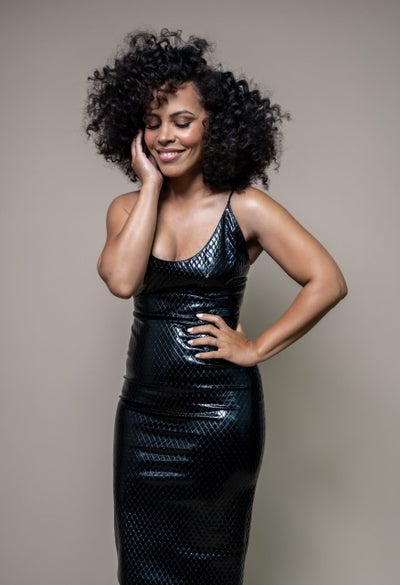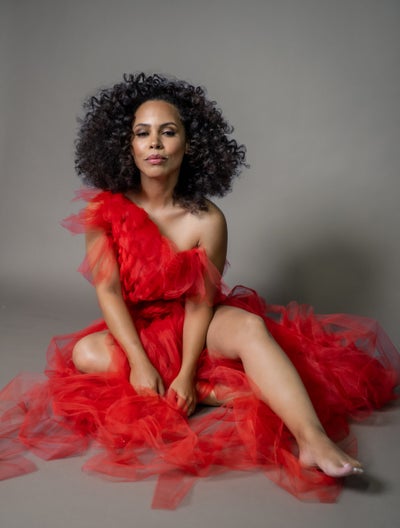Amirah Vann Embraces Her Fierce Mama Energy In Tyler Perry’s 'A Jazzman’s Blues'

Amirah Vann knows she gives off serious mama energy on screen and she’s made peace with it. Long before she welcomed a child of her own in the world, the now 42-year-old actress was cast as the ferocious and flawed Ms. Ernestine, enslaved mother to three enslaved children, in the historical drama Underground. Now, she’s taking on another dynamic mother role. This time in Tyler Perry’s latest effort, A Jazzman’s Blues, coming to Netflix on Friday, September 23.
The period piece, taking place over 40 years, follows the forbidden love between Bayou (Joshua Boone) and Leanne (Solea Pfeiffer). Twenty seven years in the making, it’s a coming-of-age story about heartbreak and family secrets in the confederate south.
In Perry’s vision, Vann portrays the role of Hattie Mae, Bayou and Willie Earl’s mother.
“This woman is a mother who is balancing,” Vann tells ESSENCE. “During the day she’s a washerwoman and a doula and at night; she’s singing and entertaining her community. This is all in the 1940s segregated south. This woman is surviving that. That in and of itself is impressive. But she has a beautiful arc. By the end of the movie, she reaches a dream and opens a juke joint.”
As she lends herself to these dynamic portrayals, Vann takes on roles that have something to offer her as well.
“I think I just get attracted to roles where I walk away better,” Vann explains. “That’s exciting for me because I see a window in but I also see a window into a new, larger, bigger, more robust me. And if that does it for me, I’m excited to hopefully inspire another woman to feel that way.”
In addition to expanding Vann, this portrayal will also perhaps broaden the way audiences perceive Vann’s talent as well. The New York native has a background in theater but this is the most she’s sung in a film project.
“We got to work with Terence Blanchard. Chile, he’s brilliant musically but then he’s so down to earth, which is very similar to Tyler,” Vann shares. “Visionaries with great vision but so down to earth and accessible. It really made the songs come to life and reminded all of us to just tell the story simply.”
Vann jumped into this story just three weeks after giving birth to her daughter Nyla Fe Oyeku, whom she shares with her partner, Patrick Oyeku. It was Tyler’s care and Vann’s own drive that made it all possible.
“I always felt supported,” Vann says. “That’s a great feeling as an actress, as a woman. Luckily, too, I have a great support system. My partner’s fantastic. My family’s fantastic. And I’m ambitious. So even when I read the script, every part of me said, ‘Let’s do it.’ It starts in your mind. If you think you can, you really can. And then you just nap in between.”
Part of Vann’s drive and ambition comes from the people who came before her, specifically her parents. She reflects on her mother’s sacrifices as she and her family made a life for themselves in Far Rockaway, Queens. Vann recalls receiving cereal for Christmas one year and her mother driving a bus in order to expose her to the finer things in life.
“As a kid, I remember a joyful childhood,” Vann shares. “As I grew up, I realized the struggle.”
On the night of Jazzman’s world premiere during TIFF, Vann felt the presence of her late father.
“Both of my sons in the movie remind me so much of my father’s journey. My father died when I was 9. He didn’t survive America, what a Black man in this country has to try to survive and endure. You see two journeys with my two sons in the movie.”
The connection between the film and Vann’s own ancestral roots left her feeling deeply grateful to be experiencing all of it.
“I was definitely in tears the night of the premiere, just meditating on all of that,” Vann says. “And I was glad I allowed that in. A lot of times, you hustle as an actor. You go, go, go. I wasn’t allowing myself to realize, there’s no reason I should be here. It’s a huge gift to be able to just work, then to be able to work on such a prestigious film. Then to be able to be successful, be alive in this country, doing what I love. I take none of it for granted.”
As audiences view this film, Vann hopes they reflect on the reason why we’re here and what our collective role in society might be.
“We have a responsibility with how we move through this world, how we interact with each other,” she says. “There’s struggle in that but also beauty in what’s possible.”
Source: Read Full Article

